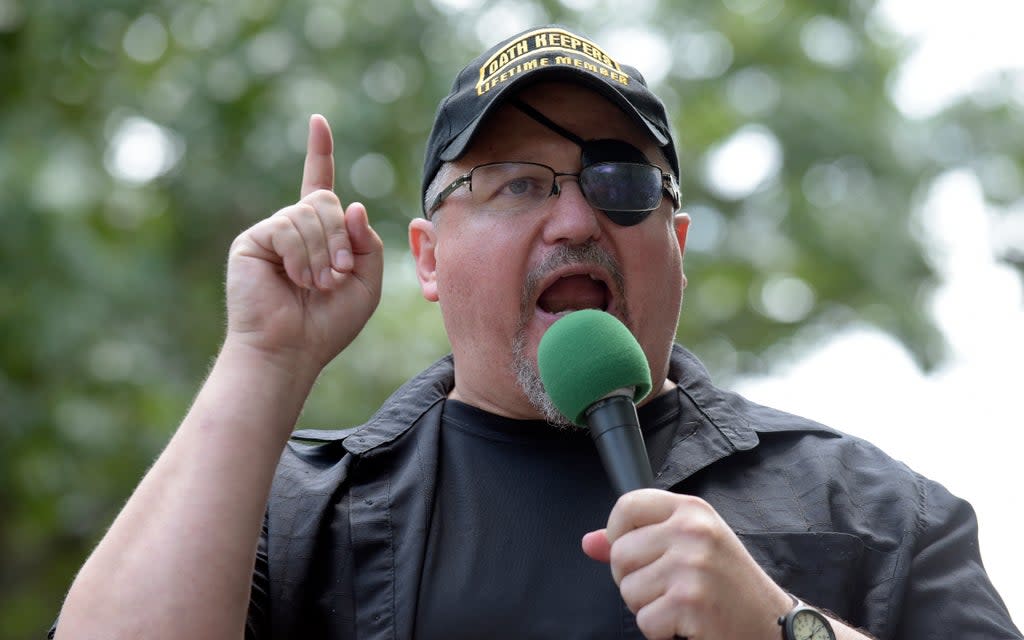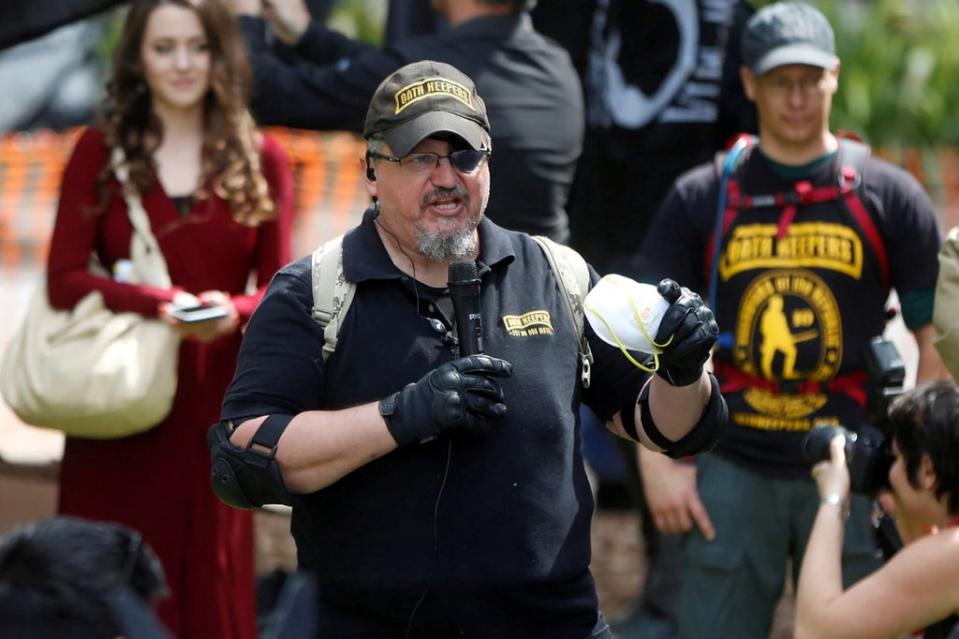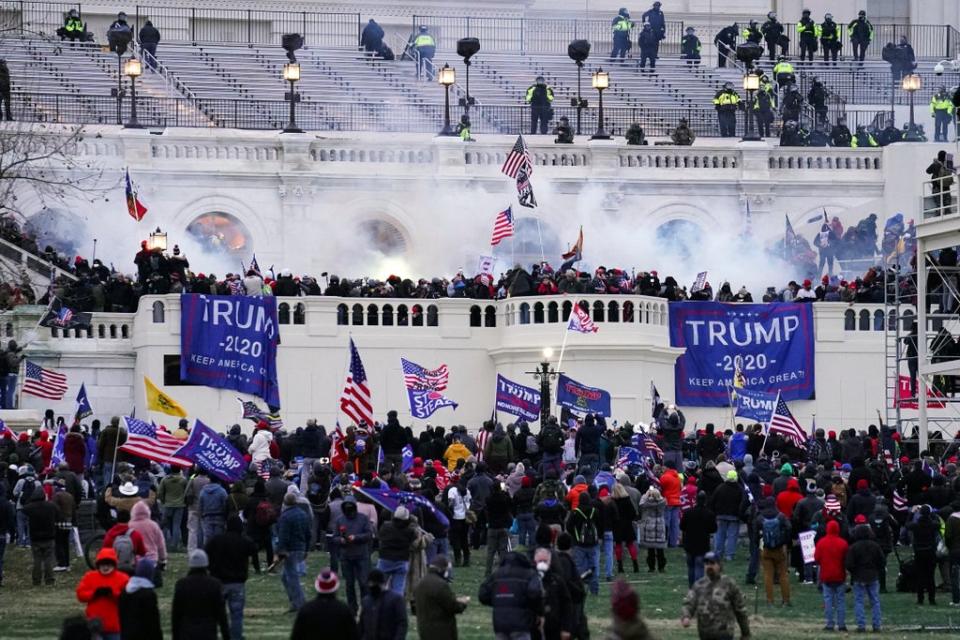What is seditious conspiracy and why is it a big deal?

The US Justice Department’s efforts to hold those responsible for the 6 January insurrection shifted into a higher gear this week with the unsealing of a 48-page indictment against Oath Keepers founder Elmer Stewart Rhodes and 10 other members of his right-wing militia group.
All but Mr Rhodes and another defendant – Edward Vallejo of Phoenix – had previously been charged with crimes for their roles in the worst attack on the Capitol since British troops commanded by Major General Robert Ross set it ablaze in 1814.
Prosecutors have filed criminal charges against more than 730 people over the year that has passed since the attack, but the indictment of Mr Rhodes and his alleged co-conspirators stands out because it charges them under a rarely used provision of law that can found in the chapter of the US criminal code titled “Treason, Sedition, and Subversive Activities”.
Known to lawyers as “Section 2384,” it lays out an offense known as “Seditious Conspiracy” – which is committed when “two or more persons” conspire to “overthrow, put down, or to destroy by force the Government of the United States,” “prevent, hinder, or delay the execution of any law of the United States” by force, or “seize, take, or possess any property of the United States contrary to the authority thereof”.
Prosecutors have charged Mr Rhodes and his co-defendants under the part making it a crime to conspire to “prevent, hinder, or delay the execution of any law of the United States” by force, alleging in the indictment that the purpose of their alleged conspiracy was to “oppose the lawful transfer of presidential power by force, by preventing, hindering or delaying by force the execution of the laws governing the transfer of power”.
They also face charges under a different part of the US code which makes it a crime to obstruct an official proceeding, which until Thursday was the most serious offense anyone has been accused of as a result of their participation in the pro-Trump riot.

That prosecutors have chosen to invoke the seditious conspiracy statute in the first place is notable in and of itself because it has been used to prosecute only a handful of people in the last half-century.
The last time anyone faced charges for an alleged seditious conspiracy was in 2010, when federal prosecutors in Michigan secured an indictment against nine members of the right-wing Christian militia movement Hutree for “conspiring to oppose by force the authority of the U.S. government”.
Ultimately, however, that case failed after a judge ruled that it had been “built largely of circumstantial evidence”.
“While this evidence could certainly lead a rational factfinder to conclude that ‘something fishy’ was going on, it does not prove beyond a reasonable doubt … [the militia members] … reached a concrete agreement to forcibly oppose” the government, US District Judge Victoria Roberts wrote in an opinion acquitting the defendants of seditious conspiracy.
Before that, the most notable conviction for seditious conspiracy occurred in 1995, when a New York jury convicted Muslim cleric Omar Abdel-Rahman — the so-called “blind sheik” — for exhorting a group of his followers to bomb targets around New York City.
Glenn Kirschner, a former DC assistant US attorney, told The Independent the reason seditious conspiracy charges are so rare is in part because “it's not all that often that people try to get together and conspire to violently overthrow the United States government, and then take at least one overt act toward that end”.
“This kind of a crime is not committed all that often,” he explained.
Mr Kirschner added that reason such charges are so infrequently brought against defendants is because seditious conspiracies are difficult to prove, and his experience federal prosecutors often posses what he described as “hyper-cautiousness often bordering on timidity”.

This has led prosecutors to eschew seditious conspiracy charges when they can charge other equally serious offenses that are easier to prove beyond a reasonable doubt to a jury.
“If we have a series of lesser charges short of seditious conspiracy — destroying property, assaulting folks, assaulting government officials — there may be no need to reach for the most serious charge because you feel like your body of evidence can more easily and readily prove the lesser charges, and let's face it, at the end of the day, it's all about what's the appropriate penalty,” he said.
“If I have to go with a seditious conspiracy charge which carries up to 20 years but I know it's going to be tougher to prove, or I can go with a series of lesser charges, like obstructing an official proceeding or any other series of lower-level offenses, assault, assaulting police officers, destroying government property, et cetera, and I can still get a sentence exposure to a period of incarceration that I think is appropriate and fits the series of crimes, then why am I going to play against myself as a prosecutor and try to prove something where I'm not really getting any additional return other than the deterrent value of saying we banged somebody out for a seditious conspiracy?”
But in the case of Mr Rhodes and his alleged co-conspirators, Mr Kirschner said the evidence appears to be so overwhelming that prosecutors had little reason to avoid charging them.
“When you read that 48-page indictment, it'll curl your toes. They had an arsenal, you know, across the river in a motel room ready to be deployed,” he said, calling what the 11 defendants are accused of is “violent,” “coordinated,” and “a direct attack on the transfer of presidential power”.

